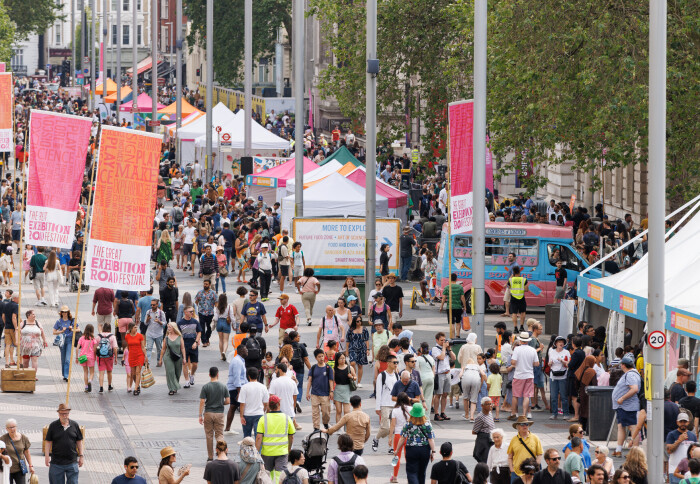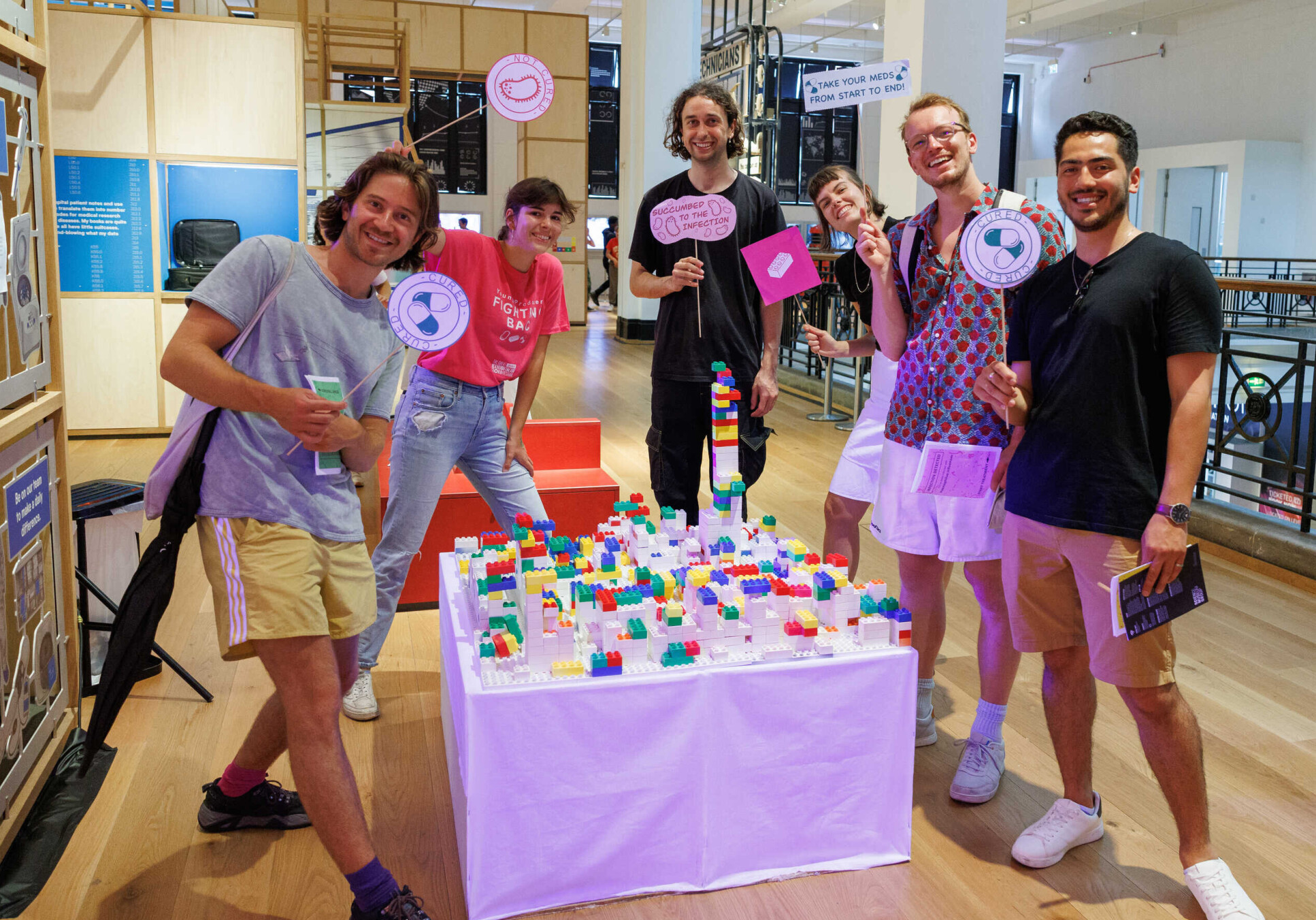Awe-some programme inspires visitors at Great Exhibition Road Festival 2023
by Nisha Emich

South Kensington’s science and culture institutions presented the power of awe and wonder at this year’s Great Exhibition Road Festival.
Across a jam-packed weekend of awe-inspiring talks, wondrous workshops and innovative events, this year’s Great Exhibition Road Festival welcomed around 50,000 to 55,000 visitors of all ages.
Hundreds of free activities were organised by Imperial College London and its partners, including the National History Museum, V&A, Science Museum, the Royal College of Music, the Royal Albert Hall and many more.
Researchers and academics engaged with visitors on topics like climate action, food sustainability and medical innovations, hearing their thoughts and questions. Imperial physicist Elizabeth Pasatembou, who helped create an atomic silent disco, remarked:
“I was deeply moved to witness people enjoying the workshop and actively engaging with the science. Their enthusiasm gives me the motivation to continue my work and sharing it with the world."
From the cutting-edge scientific breakthroughs of today, predictions and hopes for the future, and untold stories of the past, this year’s festival had something for everyone, and we couldn’t be more thankful to the people and places – including hundreds of student volunteers – that made it happen!
Soaking up the atmosphere
Across a warm (and mostly sunny!) weekend, South Kensington’s museums, cultural organisations and research institutions threw open their doors and helped transform outdoor spaces around Exhibition Road.
 Visitors navigated their way through themed zones: from robotic friends in the Smart Machines Zone to revolutionising our future cities in Building the Future Zone. All while enjoying music across three main stages, delighting at large-scale art pieces and sampling cuisine from around the world at numerous food stalls.
Visitors navigated their way through themed zones: from robotic friends in the Smart Machines Zone to revolutionising our future cities in Building the Future Zone. All while enjoying music across three main stages, delighting at large-scale art pieces and sampling cuisine from around the world at numerous food stalls.
If that wasn’t enough to satisfy their appetites, they could pop into the Future Food Zone, which had plenty of tasty samples to enjoy – from hearty plant-based stews to protein-packed cookies made with cricket flour! Future Food Live brought chefs and food scientists together to question how what we eat may change, all while cooking up a storm, and visitors with a sweet tooth could stop by the chocolate fountain to learn about fluid dynamics.
Vicky Brightman, Festival Director and Head of Public Engagement at Imperial College London said:
“Each year I’m incredibly impressed at the range of creative experiences offered at the festival, which plays a unique role in connecting a wide range of our research with members of the public. I’m so grateful to the staff, students and partners who help bring this weekend to life... and to the thousands of visitors who bring boundless insight and enthusiasm, helping inform and strengthen Imperial’s work.”
Exploring ideas
The festival talks programme traversed topics like the real Loch Ness Monster of the Jurassic period to a visual tour of the wonders displayed at the original Great Exhibition in 1851.
Professor David Nutt, Director of Imperial’s Neuropsychopharmacology Unit, took listeners through a 250-year history of the brain on drugs, considering how cognitive performance and creativity could be chemically enhanced today.
Dr Claire Asher was joined by Dr Glyn Morgan, curator of the Science Museum’s Science Fiction exhibition, and robotics researchers Professor Thrishantha Nanayakkara and Professor Bani Anvari, to explore how the world of science fiction compares with robotic and artificial intelligence reality.
 And in a family-focused talk, space scientist, Imperial alumnus, science educator and presenter of the BBC’s The Sky at Night, Dr Maggie Aderin-Pocock, answered all the questions curious kids might have about the Universe – from whether there are rainbows on other plants, to what dinner tastes like on the International Space Station.
And in a family-focused talk, space scientist, Imperial alumnus, science educator and presenter of the BBC’s The Sky at Night, Dr Maggie Aderin-Pocock, answered all the questions curious kids might have about the Universe – from whether there are rainbows on other plants, to what dinner tastes like on the International Space Station.
Dedicated spaces
The festival carved out curated spaces for different age groups, including an oasis for adults in the Creative Science Zone, which hosted the festival’s first late-opening event, complete with DJ sets and a pub quiz!
"It was really important for us to create a space for local young people at the festival, a place that they felt it was made for them specifically and where they could explore topics that interest and concern them, while also putting their own spin on the programming,” Cristina Torrente Public Engagement Programmes Coordinator (Young People), Imperial College London
The NextGen Zone ensured teenagers and young adults could hang out together, while engaging with games, workshops, interactive installations and displays created with young people in mind.
From a chill-out area with snacks and silent-disco to the Bad News videogame, exposing tactics used to mislead people by putting you in the shoes of a fake-news monger.
This zone was also home to Fighting Bac – which explored how bacteria can become resistant to antibiotics due to overuse – created by the Young Producers, who help ensure local young voices and values are embedded into the festival.

Bringing together science and the arts
With a unique cluster of scientific, educational and cultural sites situated near each other, the Great Exhibition Road Festival brings these institutions together to engage the public. Although sometimes seemingly disparate, science and the arts offer us new ways of thinking about the world and help to inspire change.
Academics and artists collaborated throughout the weekend, offering visitors unique experiences: from a symphony inspired by the solar system, followed by a talk with composer Amanda Lee Falkenberg and space scientist Professor Mark Sephton; to Paint Lab, where festival goers witnessed scientific research from Imperial colliding with creative expression in real time.
 As Imperial PhD student Mahika K. Dixit – who shared a spoken-word piece at Story Lounge on what we might tell future generations about the planet – put it:
As Imperial PhD student Mahika K. Dixit – who shared a spoken-word piece at Story Lounge on what we might tell future generations about the planet – put it:
“science and art aren’t really that different, when you dig deep enough, they both have order and chaos in equal measure, as many answers as there are questions.”
We hope to keep asking questions and exploring answers in many Great Exhibition Road Festivals to come and look forward to welcoming you back in June 2024!
Article text (excluding photos or graphics) © Imperial College London.
Photos and graphics subject to third party copyright used with permission or © Imperial College London.
Reporter
Nisha Emich
Office of the Provost
